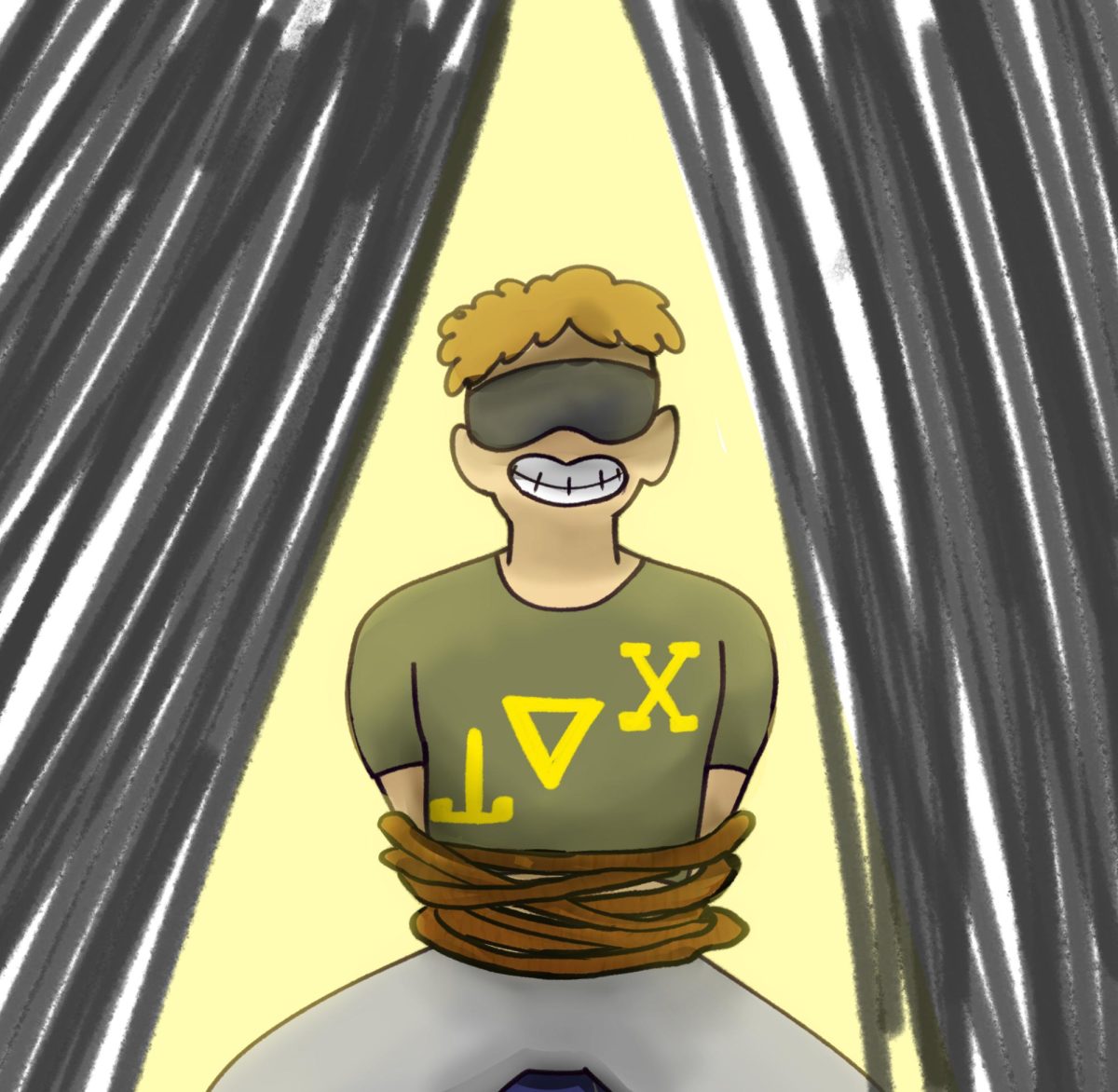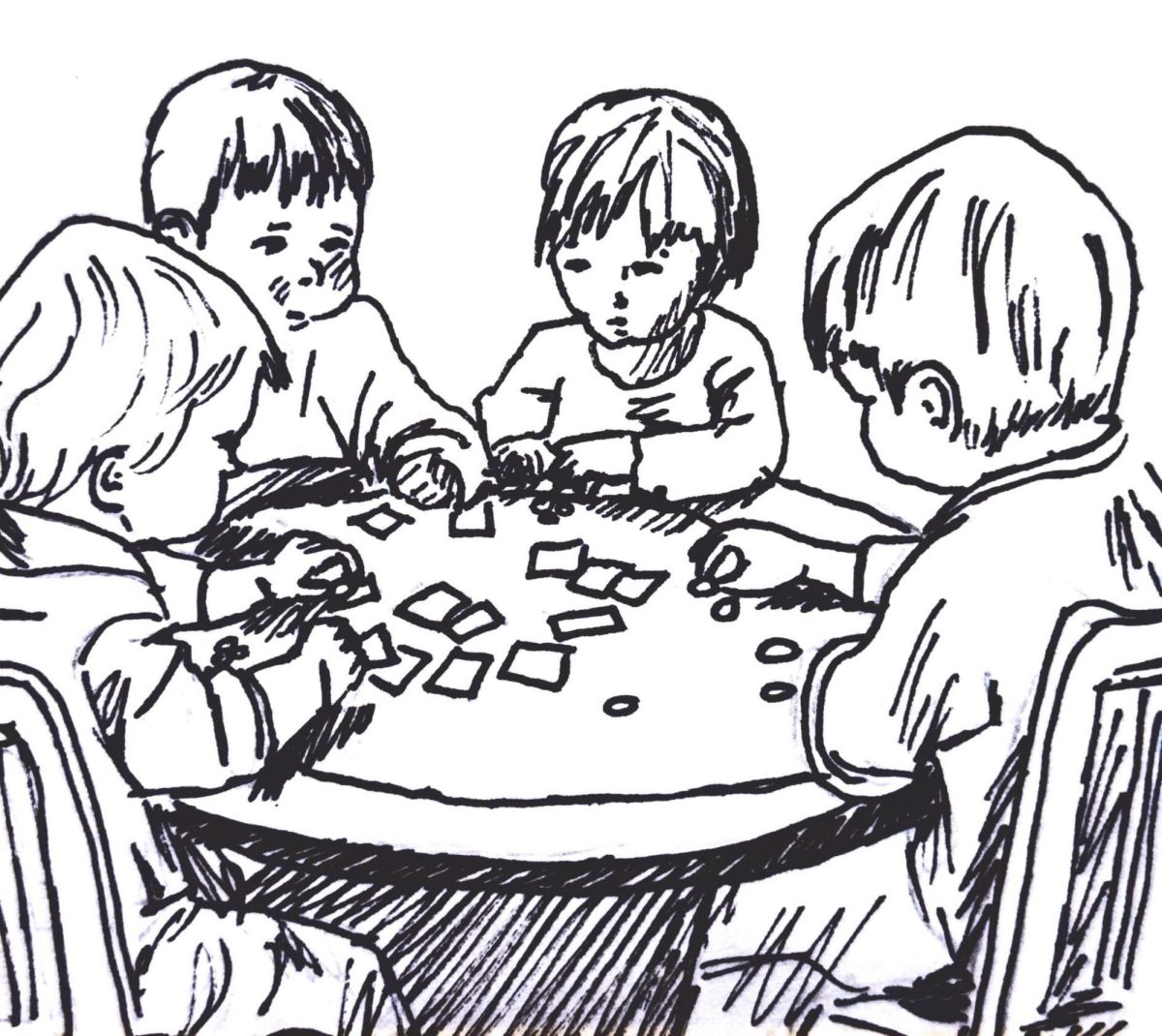Illustration by Andrea Nebhut
Of all the ‘controversial’ opinion columns I’ve written over the past year, I believe this will truly be the most contentious of all. Are you ready for it?
The objectively best and most valuable First-Year Experience (FYE) class is HUMA: Great Books of the Ancient World. In fact, I’ll even take it a step further to assert that HUMA should be the only FYE, with every single incoming first-year taking it.
Of course, I am extremely biased in favor of HUMA. I was placed in HUMA when I was a first-year, and I had the incredible opportunity of being a peer tutor this past fall. My love of HUMA was part of the reason why I decided to spend three semesters taking Latin for my foreign language credit instead of one of intermediate Spanish just to get it over with. My accounting major roommate’s love of HUMA (and the professors) led her to accidentally get a classics minor from taking so many of Benjamin Stevens’s courses, and there is an endless amount of other similar stories.
Simply put, HUMA exposes students to material which they will otherwise not see at university unless they are one of the precious few who decide to take on a classics major or minor. While many of the other FYE topics are also unique in nature (Being Young in Asia, Science Fiction, Creative Genius) — they are subjects that are traditionally not taught in a classroom setting and don’t really necessitate formal teaching. While some aspects of these courses take on traditional teaching elements (the art history portions of Arts and Ideas or the scientific lessons of Climate Change), many of these courses are about things which most incoming students already have at least a degree of knowledge.
This isn’t so for HUMA. For many students, a HUMA class is the first (and sadly last) time they’ll interact with the works of Homer, Virgil, Aeschylus or Sappho. The universal lessons which can be learned from epic poetry or Greek tragedy are beyond compare and ripe for connection-making in later courses.
Then there’s the aspect of rigor. As the first FYE upon which all FYEs are built, HUMA has a structure which has been perfected throughout the years. As many students who were placed in HUMA will attest, HUMA seems to be on a higher level of difficulty than many of the other FYEs, especially due to the large volume of readings. It’s a class that is known to produce vastly improved writers, readers and critical thinkers, which is much of the purpose of the FYE.
The importance of HUMA goes beyond just teaching students to be good at quickly writing quality essays or discussing tales written by a bunch of old dead people. It also speaks to the fact that Trinity is a liberal arts university that still values the study of the humanities. Even though our business and STEM programs are robust and impressive, at the end of the day Trinity is still a liberal arts educational institution. We’re here not just to learn the job skills we’ll need in the future, but to be educated in the holistic sense of the word.
The classics are indispensable in a liberal arts education, as they form the bedrock education is built upon. Reading the stories and ideas of the past gives us a basis on which to interact with the present, and the context with which to anticipate the future. While HUMA is not the end all be all for a liberal arts or classical education, it is a perfect starting place for any student entering Trinity University. It will set them up for success like no other and help them appreciate where we as a human society have come from in regards to education.
If you missed out on HUMA when you were a first-year, check out a classics course or take the deep dive and enroll in Classical Greek or Latin. You may be surprised how much you love the ever-expanding world of the classics and see why it has endured for millennia upon millennia.












Monique • Mar 22, 2019 at 3:46 pm
Well, some of us are in strenuous majors where don’t have time to read even for pleasure. I was an engineering student when I was in trinity and our course loads are much different than the other (cough- non STEM departments) were taking 17 credit hours our first semesters (compared to my poli-sci friends who usually took 12 with one ambitious gal taking 15). Taking the FYE courses helped expose me to improve my writing (I actually was invited to switch majors to literature if my engineering feel through but I’m an engineering grad now) and learned about other bodies of literature such as “the dark imagination” where we read work from Neil Gaiman and Angela Carter and even watched a French film heralded as the one of the sources of the steampunk aesthetic. Just because some bodies of work are traditionally held as the pinnacle of importance that doesn’t mean other works have less value. Frankly your view that HUMA is the only one you think is necessary tells me you may have not had a varied education before college or you may possibly have a belief that European literature is inherently more valuable and has more artistic merit than other works published in the same eras. Either way I recomend trying to take advantage that trinity is not pat robertsons liberty university.
A Trinity University Graduate from the 2000s • Feb 24, 2019 at 12:28 pm
I am a Trinity graduate from the 2000s who studied under the Common Curriculum, and I am disappointed by the very narrow definition by which you define a “proper” liberal arts education, namely, one that elevates an ancient western “classical” above all others and is the only acceptable “bedrock” of education. I am disappointed that you dismiss all subjects outside of this narrow canon as not necessitating formal teaching.
I am in no way dismissing this canon; indeed, I entered Trinity as a first-year intending to major in Classical Studies. Due to scheduling conflicts my first semester, I prioritized a 4000-level German class over taking an introduction to Ancient Greek, and I registered for an array of other classes, including those in the Anthropology department, which ultimately became my primary major. By your definition, even though I studied human cultures from around the globe and from prehistory to the present, I focused on the “wrong” people and time periods and thus missed out on a real liberal arts education.
I am also concerned that you seem to feel that the HUMA courses and professors are the only channel through which to improve one’s writing, reading, and critical thinking. Having tested out of Writing Workshop, I don’t know what, specifically, was taught in those classes, but I would argue that my English Department classes with professors like Dr. Grissom and Dr. Balbert and my German literature classes with Dr. Sullivan were catalysts in improving my own writing, reading, and critical thinking skills. My First Year Seminar class improved these skills as well and introduced me to classmates I would likely have never met outside of this class.
Curiously, it was not until my senior year that I finally enrolled for my first official Classical Studies class. In it, we discussed classical literature and mythology. Did it contribute to my educational foundation? Of course; every class I took at Trinity affected and improved me in some way, but in no way do I believe my education would have been incomplete without it. Has it helped me in my post-undergrad life? It’s possible that it improves my reading experience when I pick up a Rick Riordan novel.
I am thrilled that you found a passion for your particular studies at Trinity, but I would suggest that taking classes in and studying subjects from an array of disciplines spanning continents and centuries might constitute a more complete definition of a liberal arts education, and I would encourage you to explore as much as you can while you have the luxury of doing so.
Another FYE faculty member • Feb 24, 2019 at 10:52 am
I was really struck by this comment in the piece: “While many of the other FYE topics are also unique in nature (Being Young in Asia, Science Fiction, Creative Genius) — they are subjects that are traditionally not taught in a classroom setting and don’t really necessitate formal teaching.”
As a faculty member who teaches in one of the non-HUMA FYEs, I found this statement profoundly ignorant. First of all, culture, politics, and literature are all, in fact, taught in the classroom setting. Being Young in Asia allows students to explore past and contemporary politics, society, and culture–everything from protest movements to music—all of which they can then explore further through courses in EAST, the history department, etc. We have several science fiction courses on campus because science fiction allows us to grapple with weighty questions about what it means to be human. It allows us to understand our own society and the history of our society from a new perspective. Creative Genius similarly draws together a range of disciplines and pushes students to reconsider what they think they know about how humans use their intellectual capacities.
In all of these courses, students write extensively (the writing requirements for all of the FYEs are the same), read challenging texts, and engage in insightful discussion. Student writing improves dramatically over the course of the semester.
HUMA is a valuable FYE, but so are the other FYEs. The faculty have developed them with great care and time, and none of them are on frivolous topics. It is wonderful to be passionate about HUMA, which is an excellent and well-developed FYE, but to suggest it is the only worthwhile FYE offering is puzzlingly narrow-minded. I’d challenge the author of this piece to actually discuss the syllabi and offerings of the other FYE courses with the faculty who teach them.
A professor who does not teach HUMA • Feb 23, 2019 at 9:42 am
Maddie — As a professor who has been teaching a non-HUMA FYE for the past several years, reading your column initially felt like a punch in the gut. I considered writing a scathing critique of your position but then I realized that you are not deliberately trying to dismiss the hard work of dozens of professors and peer tutors across campus. You are proud of your FYE and have not given much thought to the possibility that there are many ways to “produce vastly improved writers, readers and critical thinkers.” You might not have considered the arguments that JJ makes about the exclusion of non-White and non-Western experiences.
I have always been happy that HUMA is one of the FYE offerings in our curriculum. It isn’t my thing, but there are many students and faculty who clearly enjoy it. I have encouraged many of my advisees to consider pursuing the Great Books cluster. But it is possible to celebrate the humanities and the liberal arts without bashing those who choose not to worship at the altar of “Homer, Virgil, [and] Aeschylus.” (I’m leaving Sappho out of this fight. Her historical and contemporary significance transcends the canon in which she is sometimes located.)
Every year, after commencement, professors from across campus congregate in Northrup 40 to discuss the progress of the FYE experiment, sharing a range of strategies for achieving the learning outcomes specified in the Pathways Curriculum. If you sit in on one of these sessions with an open mind and an open heart, you might be surprised to discover that HUMA is *not* the only FYE the university needs.
It is one of many FYEs that the university needs. And that’s OK.
JJ • Feb 22, 2019 at 1:49 pm
I think this article is extremely insensitive and ignorant.
I realize you just want to boast how much you love this FYE, but your emphasis on the importance of Greek literature and poetry paints a picture of history that effectively excludes any peoples not from the West. Black people aren’t included in the Western perspective of history, and your viewpoint hopes to eliminate their history completely! This leaves black students in a society in which they are taught they don’t belong in. In addition, your orientalist view specifically points out the ‘pointlessness’ of teaching about Asian history and society, and then again preaching the superiority and necessity of Western history! Not to mention what this might imply for the other cultural FYE, Inventing Mexico.
I feel like the purpose of FYE is to educate through various lenses, whether it be the cultural understandings of foreign history, or connectivity to people and their experiences (Social Justice). To reduce FYE to HUMA disrespects and invalidates the cultural history of literally everyone but white people.
I encourage you to read to read The Mis-education of the Negro to examine your troubling mindset more.